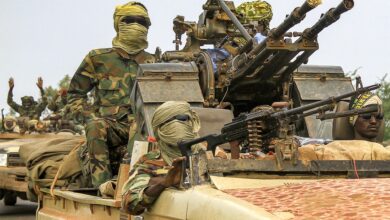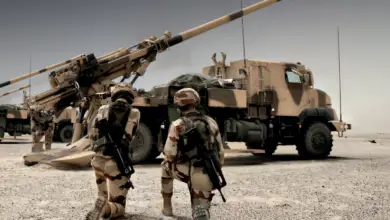
Erin A. Neale
The Atlantic Council
Whether General Khalifa Haftar returns to Libya in full health or in a coffin, the damage is done: domestic and international forces have lost faith in his capacity to lead. Almost two weeks have passed since the news of his illness broke, yet Libya’s eastern province – full of extremists and criminal networks – remains decapitated. France and Egypt are stoking the chaotic situation on the ground by delaying the announcement of Haftar’s illness and dragging their feet on finding a successor.
Libya’s complex conflict is dictated by France, Egypt, and other outside actors who have failed to treat the Libyan crisis with necessary urgency. Their mistake is being repeated during this strange episode of Haftar’s supposed illness and will leave the east in disorder.
France has invested in Haftar as a strongman in the east to the extent that the United Nations arms embargo would allow, while Egypt and the United Arab Emirates likely violated it by providing weapons and air support, according to leaked United Nations report. A former Qaddafi-regime official, Haftar defected from Muammar Qaddafi’s army and spent 25 years in the Washington D.C. area not doing much but occasionally helping the CIA. He returned to Libya during the Arab Spring and rose to power outside of the legitimacy of U.N.-led efforts in Libya, which began in 2011.
Haftar led a military operation in mid-2014 and conquered half of the country by the summer of 2017. He was able to organize a coalition of militias to form his Libyan National Army and maintain relative safety for the population in his governed regions. However, his performance has been mediocre. The big victories from which he garners legitimacy, such as the 2017 victory of Benghazi, can be partly credited to his enemies suddenly losing funding due to changes in regional dynamics rather than the general’s military expertise. Without extensive military support from outside actors due to the arms embargo, Haftar lacked the savvy, resources, and forces to command the whole country as he desired, and on many occasions, declared he would.
Nevertheless, Haftar was Egypt and France’s man. Egypt, with UAE funding, threw its weight behind Haftar to ensure security along its long, western border with Libya. Haftar’s anti-terrorism rhetoric also perfectly aligned with Abdel Fattah al-Sisi’s unforgiving anti-Muslim Brotherhood regime as well as the UAE’s counterterrorism goals.
France’s military support of Haftar in the name of anti-terrorism was kept secret until a July 2016 helicopter crash in Libya killed French special forces. Although military support has remained limited, French President Emmanuel Macron altered the playing field by bolstering Haftar’s domestic and international legitimacy. In July 2017, Prime Minister of the U.N.-backed government Fayez al Serraj met Haftar in Paris to sign a cease-fire agreement, brokered by France outside of the U.N.-led framework in Libya.
France and the Egypt-UAE camp decided to prop up the east, which blatantly countered U.N. efforts. After years of investment, neither international backer had a back-up plan for the 74-year-old general.
France disclosed that Haftar was admitted to a Parisian hospital around April 10. Almost two weeks later, the nature and severity of Haftar’s illness remain unknown and the general has not returned to his position as head of the eastern army. France’s two-week silence and inaction does not indicate to me its thoughtfulness in finding a productive successor to General Haftar, but rather an ill preparedness by not having a successor in line followed by the carelessness of leaving men on the ground with guns – without the personality that prevents them from killing each other – for two weeks (and counting).
It should be no surprise that the absence of a leader has exposed cracks in the LNA that will only deepen the longer the position is left vacant. Every hour that Haftar does not return to Benghazi – or is not replaced – leaves open the risk of more assassinations, attacks, movement of forces, and clashes under the pressure of uncertainty and the constant jockeying for a better position in Libya’s eastern army.
Other international and domestic actors are not blameless. The United States participated in the NATO-led airstrikes that toppled Qaddafi in 2011 and, after boasting about killing him, left the country with a leadership vacuum (apparently not having learned a single lesson from Iraq). Neighboring Algeria, which has a powerful army, has reacted to the acute Libyan conundrum in an appallingly slow manner. Algeria has been laying the groundwork for a long-term political solution, which is indeed necessary but does not tackle the more immediate security crisis and leadership vacuum. Finally, Libyans themselves have failed to organize and seize any structure that Qaddafi left in the country.
The international community shot itself in the foot by over-exerting its influence in Libya and leaving no room for Libyan actors to take action and lead. Now the chosen leader is sick and Libyans – and possibly all of North Africa – will suffer.
 Erin A. Neale is a research assistant at the Atlantic Council’s Rafik Hariri Center for the Middle East where she focuses on North Africa. Follow her on Twitter: @erinaneale.
Erin A. Neale is a research assistant at the Atlantic Council’s Rafik Hariri Center for the Middle East where she focuses on North Africa. Follow her on Twitter: @erinaneale.
All views and opinions expressed in this article are those of the author, and do not necessarily reflect the opinions or positions of The Defense Post.
The Defense Post aims to publish a wide range of high-quality opinion and analysis from a diverse array of people – do you want to send us yours? Click here to submit an Op-Ed.











